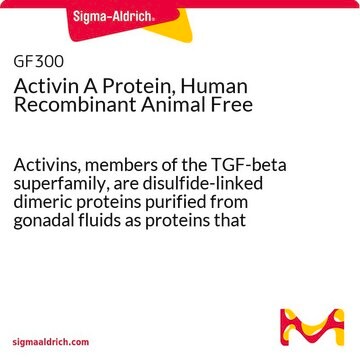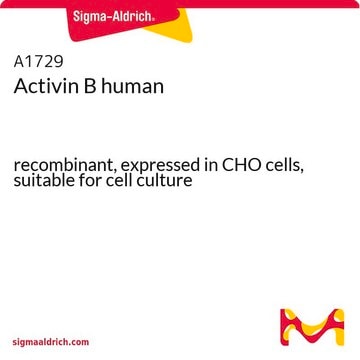H4666
Activin A human
HumanKine®, ≥95% (SDS-PAGE), recombinant, expressed in HEK 293 cells, lyophilized powder, suitable for cell culture
Synonym(s):
Activin A Protein, Growth Factor, Human Activin A
About This Item
Recommended Products
product name
Activin A human, recombinant, expressed in HEK 293 cells, HumanKine®, suitable for cell culture
biological source
human
Quality Level
recombinant
expressed in HEK 293 cells
Assay
≥95% (SDS-PAGE)
form
lyophilized powder
potency
≤5 ng/mL EC50
quality
endotoxin tested
mol wt
dimer 25 kDa (non-glycosylated)
packaging
pkg of 5x10 μg
pkg of 10 μg
technique(s)
cell culture | mammalian: suitable
impurities
≤1 EU/mg
storage temp.
−20°C
Looking for similar products? Visit Product Comparison Guide
Biochem/physiol Actions
Activin-A stimulates glycogenolysis in isolated rat hepatocytes, Mine T ET. al. (1989) and elevates insulin release from rat pancreatic islets, Verspohl EJ et al. (1993). Activin-A stimulates insulin secretion in rat pancreatic islets, Totsuka Y, et al. (1988).
Follistatin, an activin-binding protein, is a principle regulator of activin activity, de Winter JP, et al. (1996); however during embryogenesis, Cripto is an important noncompetitive activin antagonist that facilitates Nodal signaling, Kelber JA, et al. (2008).
A role for activin-A as a regulator of cell proliferation was recognized by Gonzalez-Manchon C and Vale W. (1989); wherein Act-A inhibited the growth of and induced morphological changes in CHO-KI cells in culture, in a way similar to but less potent than TGF-β.
Activin A is involved with the entire process of embryo development from germ cells thru embryonic development to adult tissues. It stimulates spermatogonial proliferation in germ-Sertoli cell cocultures, Mather JP, et al. (1990) and is a maturation factor for oocytes, Itoh M, et al. (1990). Activin A promotes proliferation of human luteinized preovulation granulose cells (ovarian granulose cells), Rabinovici J, et al. (1990).
Analysis Note
Legal Information
Storage Class Code
11 - Combustible Solids
WGK
WGK 3
Flash Point(F)
Not applicable
Flash Point(C)
Not applicable
Certificates of Analysis (COA)
Search for Certificates of Analysis (COA) by entering the products Lot/Batch Number. Lot and Batch Numbers can be found on a product’s label following the words ‘Lot’ or ‘Batch’.
Already Own This Product?
Find documentation for the products that you have recently purchased in the Document Library.
Our team of scientists has experience in all areas of research including Life Science, Material Science, Chemical Synthesis, Chromatography, Analytical and many others.
Contact Technical Service







